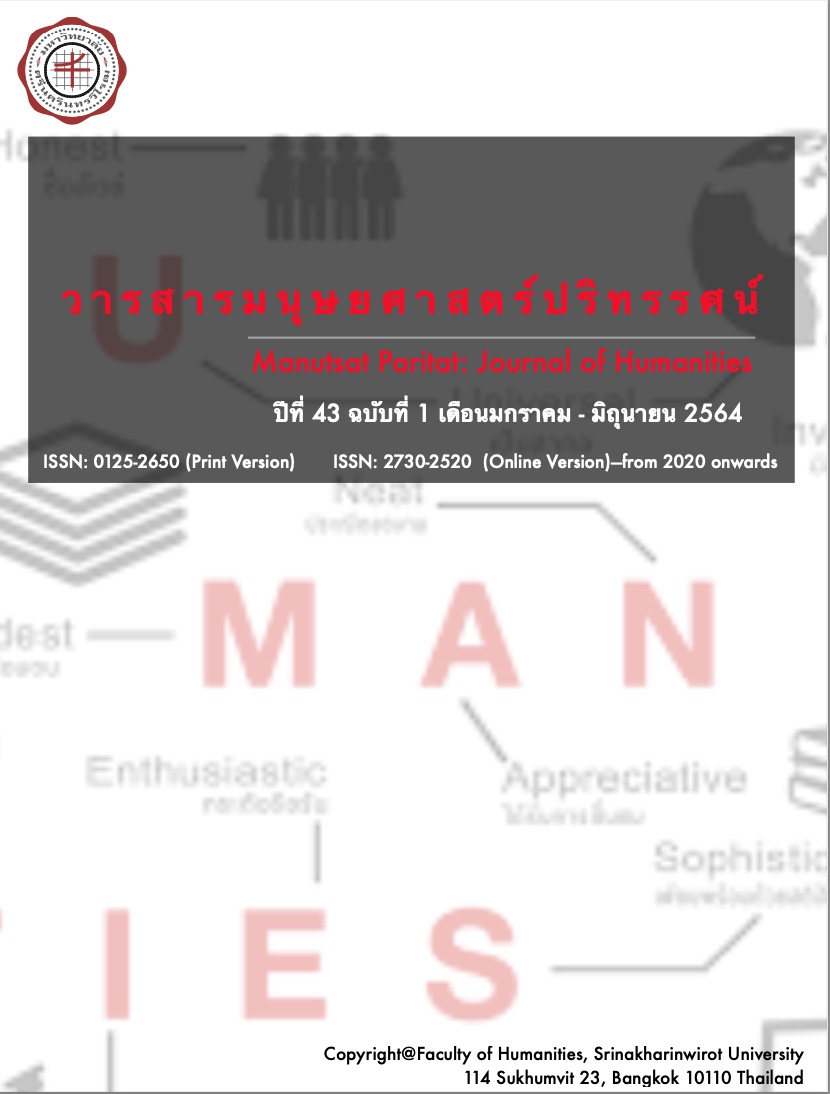The conceptual metaphors of love from Japanese music
Main Article Content
Abstract
This research aims to study the conceptual metaphors of love from Japanese music. The analysis is based on the conceptual metaphors of Lakoff and Johnson (1980) 's linguistic theory. The hypothesis is that the comparative of “the conceptual of metaphor of love” to type of “nature” will be found the most. The data were collected 55 songs from the 2020 Billboard Japan chart, selected only Japanese songs composed by Japanese in order to perceive the concept of Japanese solely. Then the metaphors in music were analyzed by classifying into each type of them. The conceptual metaphors of love reflect 8 metaphors in sequence from highest to lowest as follows: 1. Love is nature 2. Love is journey 3. Love is things 4. Love is a show 5. Love is sickness 6. Love is food 7. Love is supernature 8. Love is liquid. The number of data were appeared the most is “Love is nature” found 25 words equal to 29.07%. The result revealed that Japanese’s life is closely related to nature. Japanese’s Way of life harmonize with nature utmost. The conceptual metaphors certainly show that Japanese people use their daily experiences or things as a source of conception to compare with love in order to clarify its abstract concepts.
Article Details
Any unauthorized copying, publication, reproduction or distribution of copyrighted works appeared in Manutsat Paritat: Journal of Humanities is an infringement of the copyright owners’ rights. To authorize the copying, publication, reproduction or distribution of copyrighted works to be appeared in other printed materials or any online media, please write to MPJHthaijo@gmail.com for permission.
References
วิทยาลัย มหาวิทยาลัยศรีนครินทรวิโรฒ.
นิธิพัฒน์ สินเพ็ง. (2560). มาตรการความยุติธรรมระยะเปลี่ยนผ่านในประเทศญี่ปุ่นหลังสงครามโลกครั้งที่ 2: ผลกระทบ
และความทรงจำของคนญี่ปุ่นต่อสงคราม. วารสารญี่ปุ่นศึกษา, 34(2): 114.
ปัณณวัฒน์ บำรุง. (2018). การเล่าเรื่องวัฒนธรรมญี่ปุ่นทางรายการสารคดีโทรทัศน์ไทย. วารสารกระแสวัฒนธรรม,
21(39): 47-57.
สุภาวดี รัตนมาศ, และเมธา ชูเชิดเกียรติสกุล. (2003). ศาลาไทยและการเปลี่ยนแปลงทางสังคม. วารสารวิชาการ
สถาปัตยกรรมและศิลปกรรม, 1(1): 19-24.
ศรณ์ชนก ศรแก้ว. (2560). อุปลักษณ์เชิงมโนทัศน์เกี่ยวกับบุคคลที่สามของความรักในเพลงไทย. ภาควิชา
ภาษาไทย บัณฑิตวิทยาลัย มหาวิทยาลัยศิลปากร.
Lakoff and Johnson. (1980). Metaphors We Live By. Chicago: University of Chicago.
Nakao Manami, Nabeshima Hiroshi Jirou. (2014). Where Affection Turns into Commitment: A Metaphorical Analysis of Two Words for Love in Japanese Pop Lyrics. 英米文學英語學論集,
3: 21-44
Ooishi Toru. (2008). A contrastive study on metaphors of feeling in Japanese and English. 日本認知
言語学会論文集, 8: 274-284
Sato, Yoshiaki. (1999). The History of J-pop. สืบค้นเมื่อ 27 มกราคม 2021. จาก https://www.t-fukuya.net/j-
pop.


